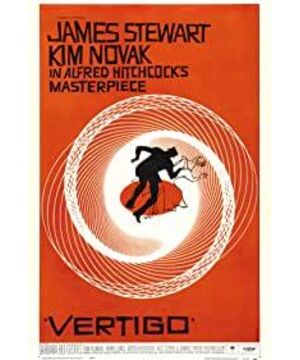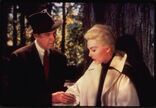It should be said that it is not unreasonable for me to criticize it at the beginning. If a person has no knowledge of the commentary and analysis about it and its director Hitchcock in advance, then he will probably get two of them immediately after reading it. Negative impression: One is that the first half of the film is a bit boring, uncomfortable, or even clumsy. The other is that although the second half of the film has a strong rebound, it is still susceptible to clichés in the setting of the plot (it’s nothing more than the protagonist falls in love with It is a false phantom, which leads to the tragedy of the real heroine. It is said that this film was once cold-received in history, and I am afraid it is not unrelated to the above two points.
However, these seemingly clichés conceal some more profound things. Let's start with a few details that are easily overlooked.
The glasses-
wearing lady Meggie seems to be a bit redundant. In fact, she withdrew from our sight in the middle of the film and no longer appeared. However, it should be noted that her exit was shortly after the scene where the heroine (actually the victim of the replacement) fell from the building for the first time. At that time, we were feeling unacceptable for the heroine to exit so quickly, and the glasses The bleak exit of the young lady implies that it is her that we are really leaving, not the heroine.
With her shameless appearance and carelessness, she is setting off the heroine's extraordinary beauty. Her image, her clumsiness, her lukewarm and passionate relationship with the hero are actually showing us that the hero originally lacks desires. The mediocre state of love life. He lacks an ideal female image in his mind, lacks the motivation to pursue, is single for a long time, has a worry-free life, and wants to be a free man.
When she desperately said that the male protagonist still loved the female protagonist and left the scene dimly, her absence truly demonstrated the perfect formation of the ideal female image in the male protagonist's heart.
Acrophobia and dizziness
The role of the actor's fear of heights is so obvious in the film that it is cheap, because the conspiracy to deceive him is tailor-made using this symptom of him. But let’s not forget, the title of the film is vertigo, which points to both the superficial symptoms of the actor’s fear of heights and the sense of confusion he is trapped in. If the love produced by the heroine in the first half of the film is particularly touching in the second half, then the love of the hero in the first half makes people feel a little weird and even uncomfortable, and in the second half it develops into a terrible paranoia.
The essence of actor love is dizziness.
When a person looks down from a height, his fear is always related to his own imagination of falling, and if he witnesses the falling of a person or thing related to him, he will have a sense of substitution, as if his own fall has been replaced. The heroine’s enigmatic beauty and her suspended animation, combined with the hero’s fear of heights, gave birth to the hero’s serious lack of heart, so he dreamed that dream that ended with his own fall, and then became demented. Stopped in the void where the vertigo hits the ground.
The protagonist witnessed the tragic situation of someone falling from a tall building three times: the first time it was his colleague who suffered from acrophobia after witnessing the tragedy; the second time it was the fake heroine, and the actor's mind developed after witnessing the tragedy Incurable deficiency; however, in the third time, when the real heroine fell off a tall building, the camera did not show us the scene of the hero looking down, because his vertigo disappeared.
This doesn't just mean that he is no longer afraid of heights.
Anti-Peeping
Many comments point out that the male protagonist has a peeping problem in the first half of the film, and it is easy to derive from it that men construct women as objects of fantasy desires, which can then be used to explain the paranoia of the male protagonist in the second half. This is generally not true. mistaken.
However, let’s not forget that what the male protagonist is peering into is a performance. The female protagonist clearly knows that the male protagonist is peering at her. In other words, it is not the male protagonist who constructs an ideal female image through prying, but the male protagonist’s heart is shaped. A female figure. What the male portrays is a given female image, but this kind of being given is accidental. The heroine's temptation of the male protagonist is not planned, and what the heroine wants to show is just an imitation.
The wonderful thing is that the heroine is performing a double imitation. She is not only pretending to be the wife of a businessman, but also pretending to be the tragic girl in the legend-Carlotta.
Don’t forget that in the dream that caused the actor’s collapse, the image that appeared was Carlotta instead of the heroine. That is to say, the actual image of the heroine was Carlota’s replacement, and the hero fell in love with that. To become the heroine of Carlotta, the image of the hero's subconscious desire is actually the legendary Carlotta.
If we understand the paranoia of the male protagonist in the second half as only the unforgettable real-life lady he is obsessed with in the first half, trying to reshape this image, then the depth of the film will be greatly reduced. In fact, the original features of the heroine who stubbornly pursued by the male protagonist are mostly metaphorical, that is, the indispensability arising from the neighboring relationship between the heroine and Carlota in the first half, only one is— —The spiral tail (that is, the last stubborn pursuit of the hero) is owned by Carlotta herself.
The spiral hair tail is also a sign of vertigo.
If we notice the scene where the actor suddenly hesitated when the heroine completely changed back to his desired image and embraced with it, we would find that the surrounding scenes reproduced a classical style that symbolized the Carlotta era. This means that the male protagonist’s desire does not originate from women in reality, but from the dizziness that arises when reality becomes a fantasy in an impossible way.
What he fell in love with was dizziness.
Therefore, the real tragedy does not lie in the fact that the male protagonist is obsessed with the original image of the female protagonist, and the female protagonist finally has to abandon her own appearance and succumb to this request; it is that the object of the male protagonist's desire is not a female entity that can be made. What the protagonist falls in love with is the woman in the process of becoming a legendary character by imitating. This kind of female image cannot be realistically become. The heroine is more or less aware of this, and this is her resistance Deeper reasons.
Since the male protagonist did not actively create a female image through peeping, did the heroine in the anti-peeping position actively create the image of her being peeped? If this is the case, she still has the possibility of choosing to become that image again. In fact, she also tried to do so, but she ended up with death.
Her death was not an atonement, but was forced to become Carlotta, because this is what the male protagonist really desires. However, Carlotta cannot be truly become, because it itself means the death and absence of the female subject.
View more about Vertigo reviews











